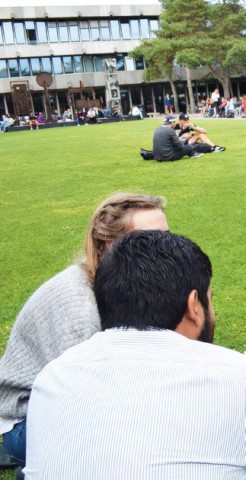Strengthening Europe’s Research: Attracting & Retaining Talent - MCAA Magazine March 2025
Europe thrives on knowledge and innovation, yet the competition for top research talent is more critical than ever. To maintain its global standing and ensure progress and sustainability in society, Europe must enhance its ability to attract and retain talented researchers. This challenge has been highlighted in the European Commission’s Communication on ‘A New ERA for Research and Innovation’ and reaffirmed in recent reports by Heitor and CAESAR (CAESAR, 2024).
“Universities are at the heart of nurturing talent and driving innovation. To fulfil this role effectively, we must ensure that research careers within our institutions are not only viable but highly desirable.” (CAESAR, 2024)
The Need for a Stronger Research Ecosystem
The European Council’s 2023 recommendation on a ‘European framework to attract and retain research, innovation, and entrepreneurial talents’ underscores the urgency of strengthening research careers. Key priorities include:
• Enhancing mobility, skills, and career prospects for researchers.
• Promoting gender equality and diversity within academia.
• Increasing funding for initiatives like the Marie Skłodowska-Curie Actions (MSCA), with several groups advocating for a doubling of its budget (LERU, 2024).

Creating better career opportunities and improving working conditions for early-career researchers (ECRs) is essential for maintaining a sustainable European knowledge ecosystem. Universities, research organizations, policymakers, and industry leaders emphasize the importance of investing in these areas to ensure long- term growth and innovation.
However, these efforts are met with challenges, particularly regarding ECRs’ health and well- being. At the same time, research suggests that young people’s perceptions of their professional lives are changing, introducing additional challenges (Drive, 2009; Haski-Leventhal, 2020).
Addressing the Future of Academic Careers
Are European universities equipped to meet the evolving needs and expectations of early-career researchers? The 2025 MSCA Presidency Conference, hosted by the Technical University of Denmark on September 18-19, 2025, will address these pressing questions. With a human-centered outlook, the conference will explore how academic institutions can adapt to attract and retain the brightest minds. Key topics include:
• Understanding the career aspirations of millennials, Gen Z, and future researchers.
• Developing strategies for an attractive and supportive research environment.
• Sharing best practices across sectors to enhance career opportunities.
• Integrating perspectives from current and aspiring early-career researchers.
• Providing universities with insights into the future of academic working conditions.
• Encouraging intersectoral mobility and valuing research experience across sectors.
Universities are at the heart of nurturing talent and driving innovation. To fulfil this role effectively, we must ensure that research careers within our institutions are not only viable but highly desirable
A Platform for Impactful Dialogue
The conference will bring together university leaders, policymakers, industry representatives, and other key stakeholders, including MSCA fellows, MCAA and Eurodoc members, funding agencies, and think tanks. By fostering discussions on topics such as working culture, well-being, academic talent programs, international initiatives like CoARA, the supervisor role, and intersectional mobility, the conference aims to generate actionable recommendations for the future MSCA programmes on motivation and working- life of MSCA fellows.
With a focus on purpose, well- being, and diversity, the 2025 MSCA Presidency Conference will serve as a key platform to shape the future of research careers in Europe. The time to act is now — ensuring that Europe remains a powerhouse of knowledge and innovation, depending on how we invest in the next generations of researchers.
Join the discussion!
Attracting and Retaining Research Talent in Europe (ART) – the Annual MSCA Presidency Conference 2025.
18-19 September
Technical University of Denmark
Lyngby, Denmark
For program details and registration see MSCA2025. dtu.dk (open April 2025)

References
CAESAR, (2024). Research Careers: A critical choice for Europe. https://zenodo.org/records/14357267
European Commission: Directorate-General for Research and Innovation, (2020). A new ERA for research and innovation – Staff working document, Publications Office. https://data.europa.eu/doi/10.2777/605834
European Commission: Directorate-General for Research and Innovation, (2024). Align, act,
accelerate – Research, technology and innovation to boost European competitiveness,
Publications Office of the European Union. https://data.europa.eu/doi/10.2777/9106236
European Council Recommendation, (2023). eur-lex.europa.eu/legal-
content/EN/TXT/HTML/?uri=CELEX:52023DC0436
Haski-Leventhal, D. (2020). The Purpose-Driven University. Emerald Publishing Limited.
LERU joint statement, (2024). We need much more MSCA! https://www.leru.org/news/leading-
research-innovation-organisations-unite-to-support-the-marie-sk%C5%82odowska-curie-actions-msca
Pink, D. H. (2009). Drive: The Surprising Truth About What Motivates Us. Riverhead Books

Mette Christiansen
DTU Office for Research Senior Executive Officer
MSCA2025 Presidency Conference organiser
mech@dtu.dk